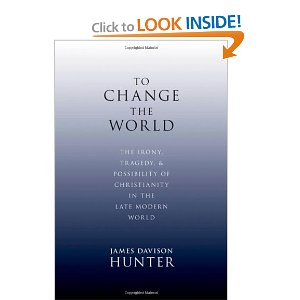James Davison Hunter has written the incredible book To Change The World: The Irony, Tragedy, and Possibility of Christianity in the Late Modern World. If you read my blog, you probably need to read this book.
Hunter studied under a longtime friend of mine, Stan Gaede. Stan and I go way back, having first met about 40-years ago. If Stan likes the guy, I like the guy. And even though I’ve never met Hunter, I do like the guy. He even uses a ministry I started a few decades ago as an example of how the Spirit is at work in the world!
So I like the guy … but do I like the book? Absolutely. I don’t agree with everything in the book, and can see how Hunter has perhaps needlessly stepped on some toes … but it’s still a great book.
Hunter has taken on an ambitious task here. The Amazon.com review says it well, “The call to make the world a better place is inherent in the Christian belief and practice. But why have efforts to change the world by Christians so often failed or gone tragically awry? And how might Christians in the 21st century live in ways that have integrity with their traditions and are more truly transformative? In To Change the World, James Davison Hunter offers persuasive – and provocative – answers to these questions.”
Indeed he has! Hunter challenges the idea that political power (or any earthly power) can shape our culture toward a more perfect representation of the Kingdom of God. He questions the notion that the only way to change the world is to change individuals. He takes on both the conservative right and the progressive left, and completes the critique by challenging the neo-Anabaptists. With each group he outlines their theological and cultural underpinnings, then deconstructs their focus on power as a way to bring about change. To Hunter, they all miss the mark.
His answer for how we are to engage culture is profound: faithful presence. I love that phrase and … well, I don’t want to define it here. You need to read the book.
Describing all that Hunter covers is beyond the scope of this short review. So let me just share a few parts of the book that I highlighted:
“Change in a culture or civilization simply does not occur when there is change in the beliefs and values in the hearts and minds of ordinary people …”
“Against the prevailing view, the main reason why Christian believers today (from various communities) have not had the influence in the culture to which they have aspired is … because they have been absent from the arenas in which the greatest influence in the culture is exerted.”
“Politics is just one way to engage the world and, arguably, not the highest, best, most effective, nor most humane way.”
“Will engaging the world in the way discussed here change the world? This, I believe, is the wrong question.”
If you want to understand the right question, read the book!

